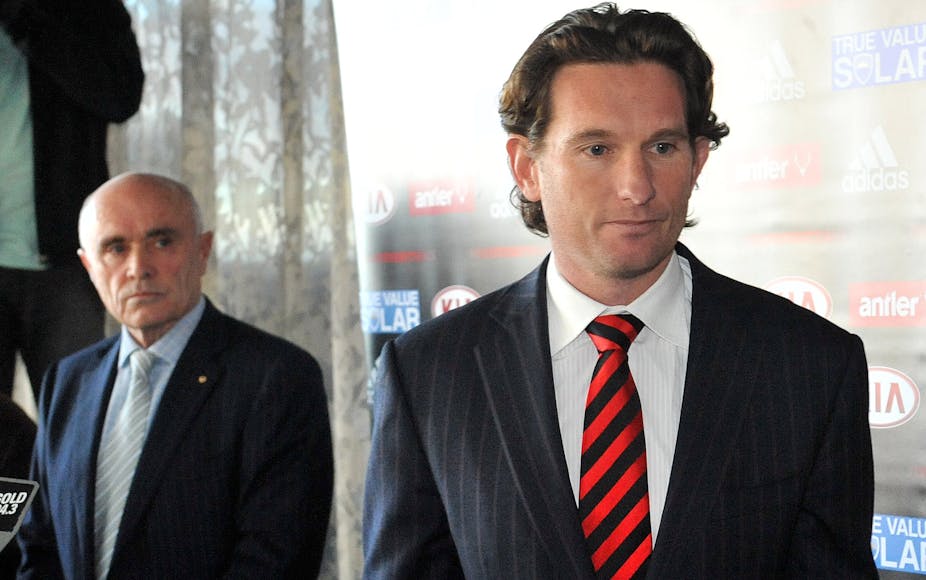It’s times like these when we get to see just how much sports like Australian rules football shape the thoughts and dreams of so many Australians. Not only has the Essendon drugs scandal dominated much of the news cycle during a federal election campaign, but it has also created the remarkable #StandByHird movement whereby many high and low-profile Essendon supporters have banded together to protest coach James Hird’s innocence.
Hird yesterday accepted a 12 month suspension from the game for his role in the club’s supplements regime during 2011 and 2012. But people who would otherwise carefully try to sort fact from fiction previously dismissed any claims of wrongdoing out of hand. The detailed AFL charge sheet that shocked non-Essendon fans and commentators has been explained away as a conspiracy, a naïve witch-hunt, and a silly drama about harmless vitamins.
So what makes academics, accountants, journalists and many others behave like this?
To understand the power of a figure like James Hird we have to put the allegations of drugs and negligence aside and instead look at what a sporting club like Essendon means to those who follow it.
To outsiders, games of Australian rules football are just that: games. They are a distraction from real life that offers the trivial entertainment of seeing grown men expending energy and kicking around a pigskin. But to many who follow the sport, it is a site of passionate investment that means so much it can make the rest of life seem the distraction.
When we ask these fans what their club means to them, they tend to speak of “love”. Indeed, the relationship with the club is often described as an idealised marriage whereby the fan commits themselves to supporting and loving their team through trials, victories, hard times and good times, to death.
Already we have a clue then, for love is the emotion most commonly associated with excess, with responses that seem to go beyond reason. Lovers are renowned for their extravagant devotion, their fevered obsession over the beloved, and for their crimes of passion when it all goes wrong. “Every lover is mad, we are told”, noted the great French thinker Roland Barthes wryly.
Footy fans frequently behave as if they’re infatuated with their club. They feel like the club is part of them, often to an absurd extent. What happens to the club – triumphs, trials, humiliation and heartbreak – also happens to them.
It’s generally the players that mediate this relationship. It’s their shoulders that bear the weight of tens of thousands of anxious hearts, minds and bodies. Contest after contest, game after game.
The result is an amazingly intimate connection between fan and player. Look at those around you when attending a sporting contest. See the intense focus of the fans as they register each action on the field, the tension that grips their bodies, the moments of frustration and pain, and the bursts of joy that explode through them when one of their players does something amazing.
James Hird was one of those rare players for whom the amazing was commonplace. Not only did he continually sacrifice his body for his club, but he brought Essendon barrackers intoxicating pleasure time and time again. And then, after the heartbreak of 1999 - when Hird spent the year injured and the team was defeated by one point in the penultimate game of the year - he led them through one of the most dominant seasons on record.

It’s not so surprising then that the infatuation many Essendon fans felt for Hird was extreme, even within the excessive world of the AFL. Many opposing fans begrudgingly admired Hird’s play, though others were put off by the anticipation of further pleasure that Essendon barrackers expressed each time he went near the ball.
But infatuation is necessarily blinding as Sigmund Freud warned nearly 100 years ago. It’s no accident that devoted footy fans frequently refer to themselves as “one-eyed”. And in the case of someone like Hird, the blindness of supporters is understandable.
For James Hird seemed like a true Essendon hero in a manner that inspired folklore. There was his lineage with his father having played a few games for the club, while his grandfather was an inaugural inductee into the club’s Hall of Fame after playing more than 100 games for Essendon, winning a premiership and then being part of the club’s committee for 20 years (six of these as club president). There was the fairytale way he had succeeded after being drafted at pick 79, winning a Brownlow Medal in 1996, and how he battled back from a series of serious injuries to lead his team to glory.
Those who puzzle at the cult of personality that seemed to make James Hird almost untouchable at Essendon need to realise just how much he has meant to the club and its fans. He brought them untold joy and was rewarded with fierce devotion. Even now they see him as sacrificing himself for the greater good, as heroes are required to do.
It will take more than a guilty plea and a year’s suspension to charges of negligence to stop many Essendon fans holding James Hird in the highest of regard. We underestimate the power of love at our peril.

